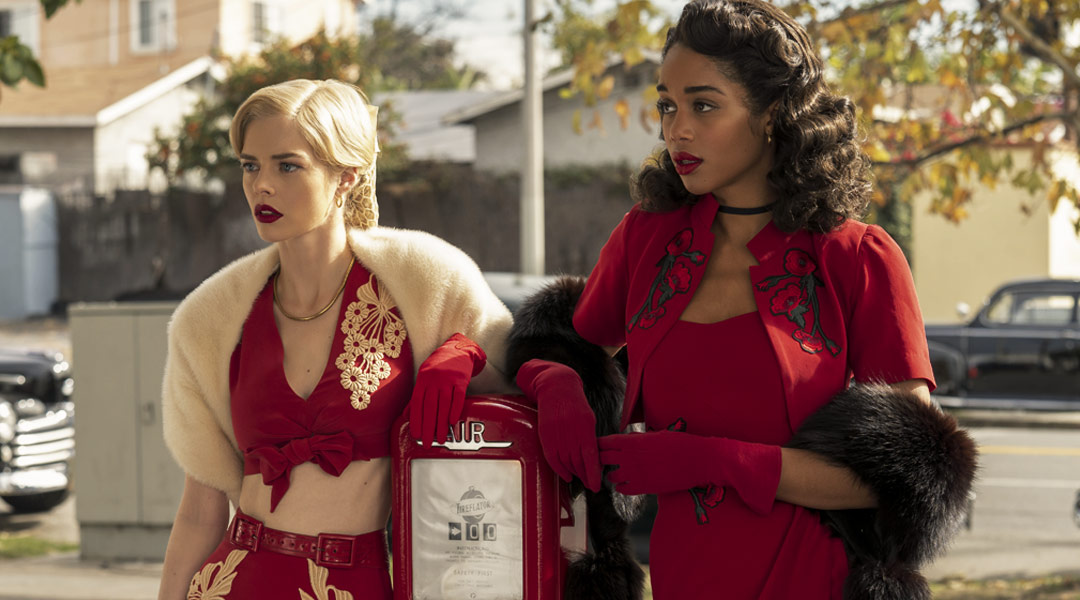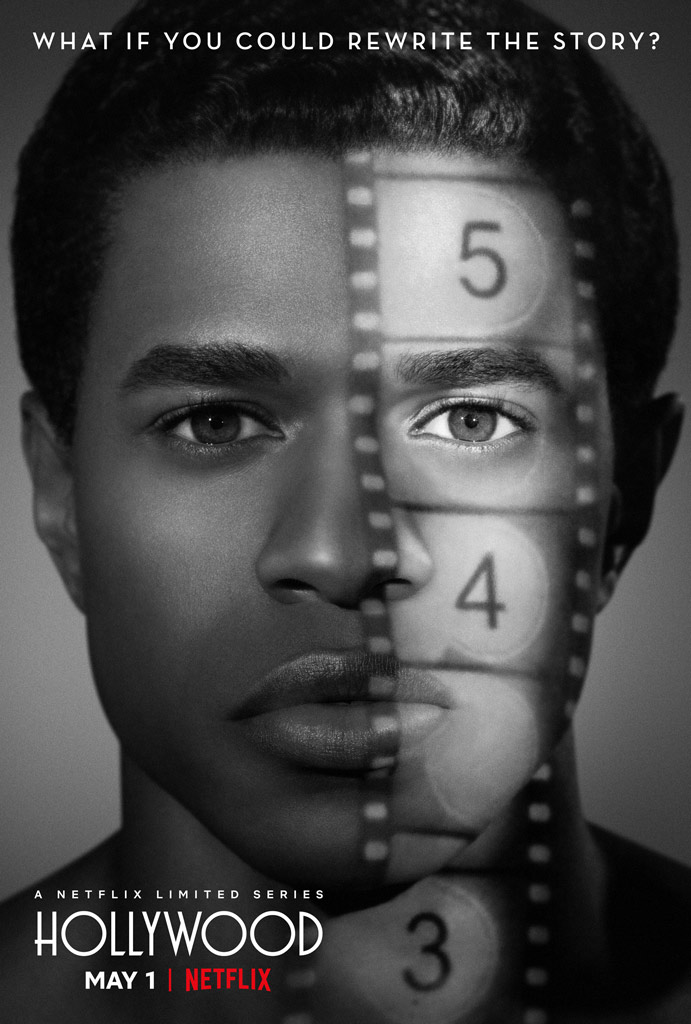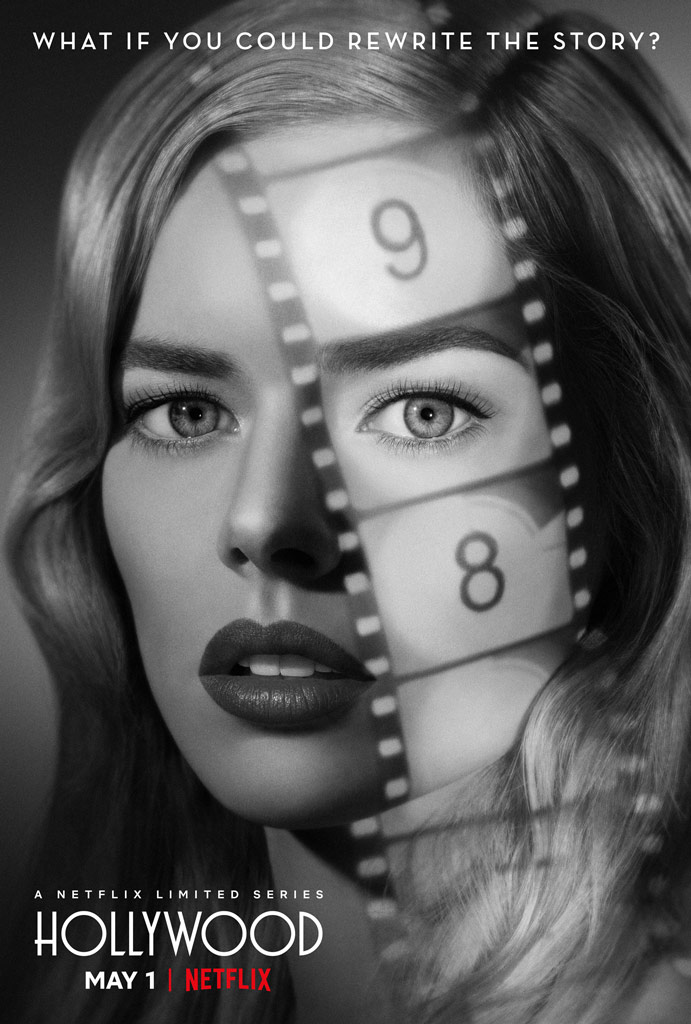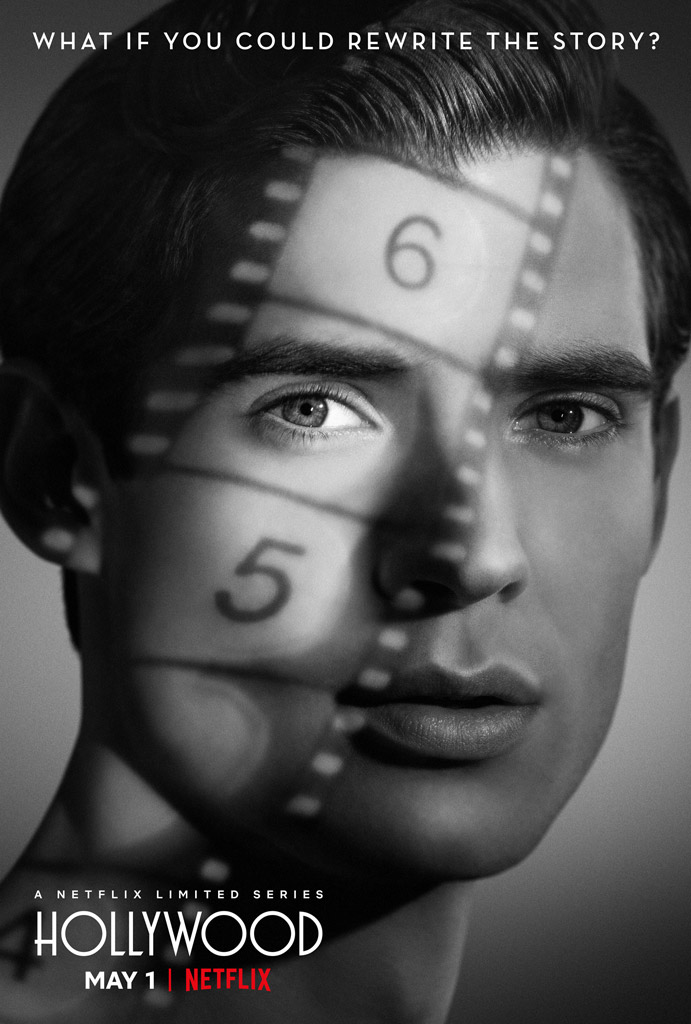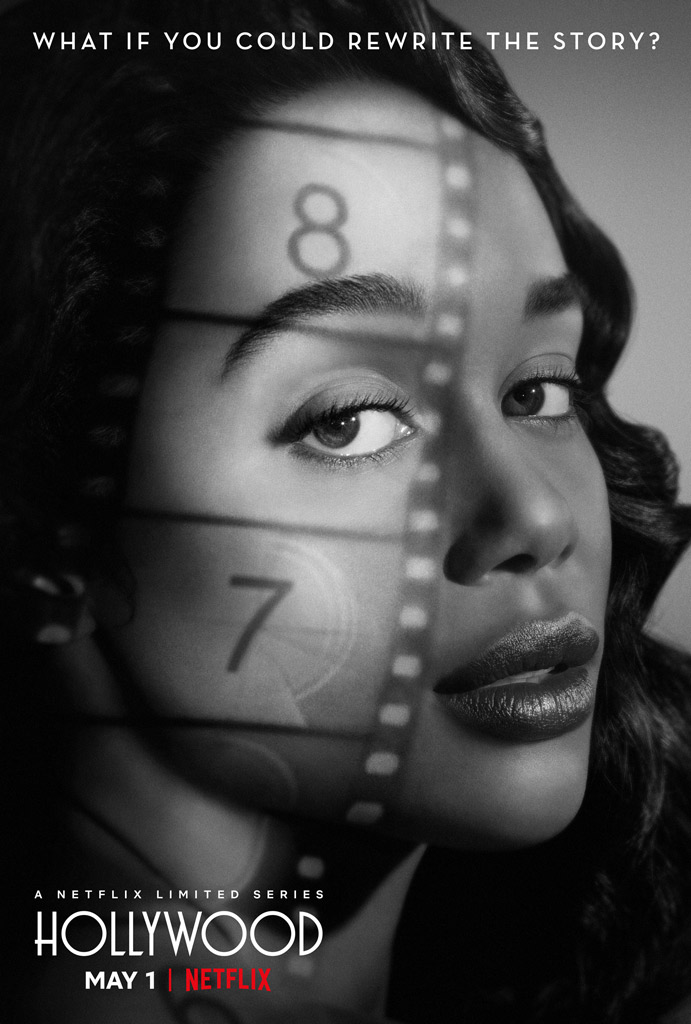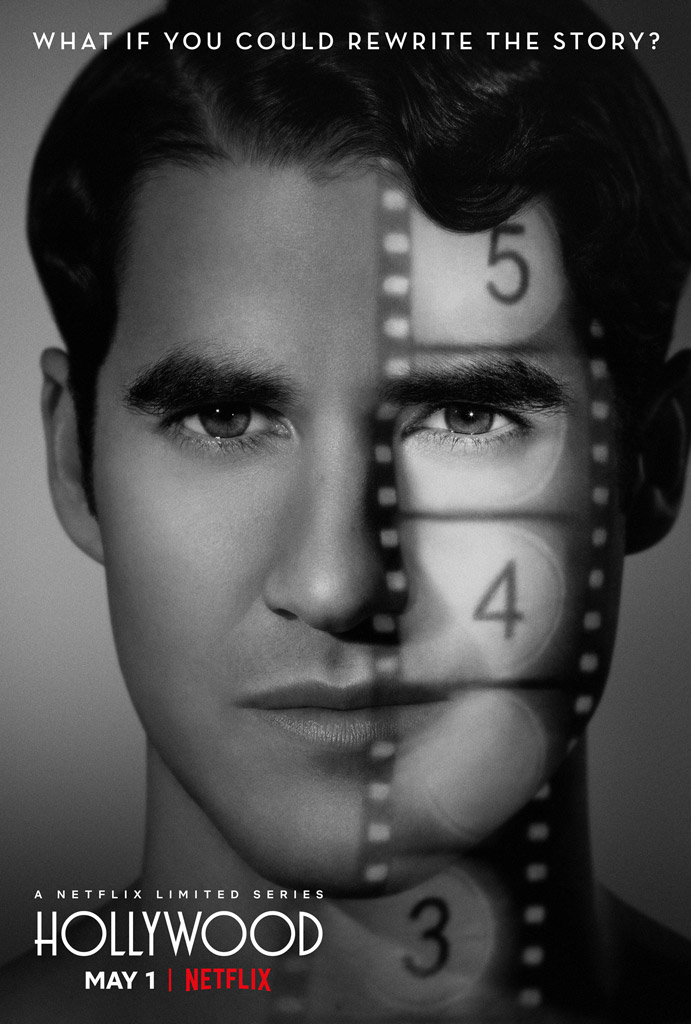Part fiction, part history, and pure subversive entertainment, Hollywood relives the glory days of cinematic past and exposes a trove of painful truths in a story long played out well after they yelled, cut.
Related: 5 Style Lessons You Can Learn From The Women Of The Politician
Even before the undulating red velvet curtains of the cinema are quickly drawn to reveal a black and white post-war PSA on the rise of Hollywood in its golden age, we are already given a fair but ominous warning in the series log line. “What if you could rewrite the story?” it posits, already luring you into a premise that is scintillatingly didactic. But that’s not all there is to it. This is Hollywood in the 1940s, with all the curling puffs of smoke and glinting mirrors firmly in place, vaguely obscuring the movie making system of passion, politics, and patriarchy. “The studio system is king, and if you make all the right moves, you too could be living in Beverly Hills…” the energetic narrator baits the shadowed audience, before finally casting its net. “The rewards for ambition are bountiful here in the beautiful Southern California sun.”
Folding his previously outstretched legs and leaning in a little closer to the edge of his seat, the camera then focuses on a young man with blue eyes gleaming with determination and coiffed swoops of hair. Clearly hooked on the potential of cinematic opportunity and glory, a smile cracks on his face and the scene cuts to the façade of Ace Studios where the contrasted gray scale dissolves to a warmth of color and the brassy overture yields to a rush of footsteps crowding gathering at the wrought-iron gates, all hoping for a chance to work at the movies.
It is suspiciously buoyant, even when Jack Castello (played to earnest and eager perfection by David Corenswet), who despite brazenly and blithely cutting his way through the throng of hopefuls to make it to the front of the pack, and using every bit of cheer and charm to fight for a shot at being picked doesn’t quite get his chance in succeeding circumstances. “Look, first breaks are hard in this town, don’t beat yourself up,” a well-meaning bartender says later, which would prove to be that rush of light slicing through a door left ajar. This is precisely what Ryan Murphy had intended from the very beginning, to take what is seemingly bleak and bolster it with prospect. “I’d been playing around with the idea of doing something about buried history for a while, and I knew I wanted to do something hopeful and optimistic—a celebration of 1940s Hollywood,” he says. “We began a lovingly constructed look at how I wished Hollywood would have operated back then; a world where women and gay people and people of color could flourish. I think the world would be very different than it is today if that had happened.”
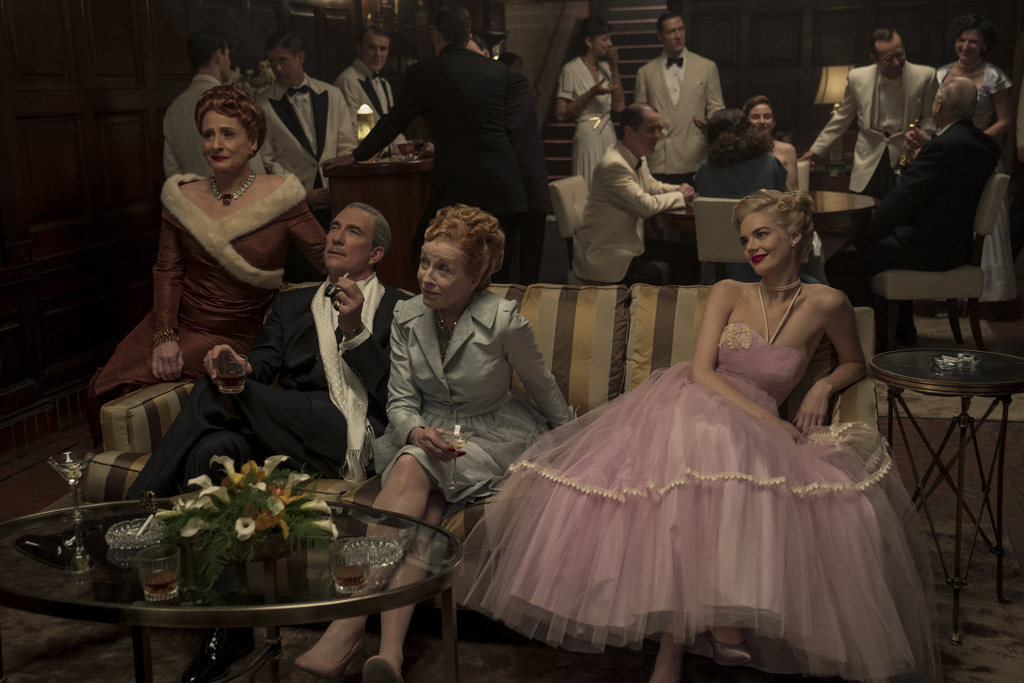
Welcome to Hollywood, the evocative exposition that explores the answers that has plagued Tinseltown since time immemorial—what if?
Taking liberties with the narrative that is so deeply ingrained in history, this Netflix Original is nothing new to the framework that Ryan Murphy tends to operate on. With the diligence of a biopic, the romp of a sordid soap opera, and the sharpness of social commentary, this hybrid of disciplines not only relives the allure of moviemaking in its prime, but it also re-imagines and repurposes the story as a fine-tuned lens into a possibility had everyone been given their chance to shine, in the realest sense of the cliché.
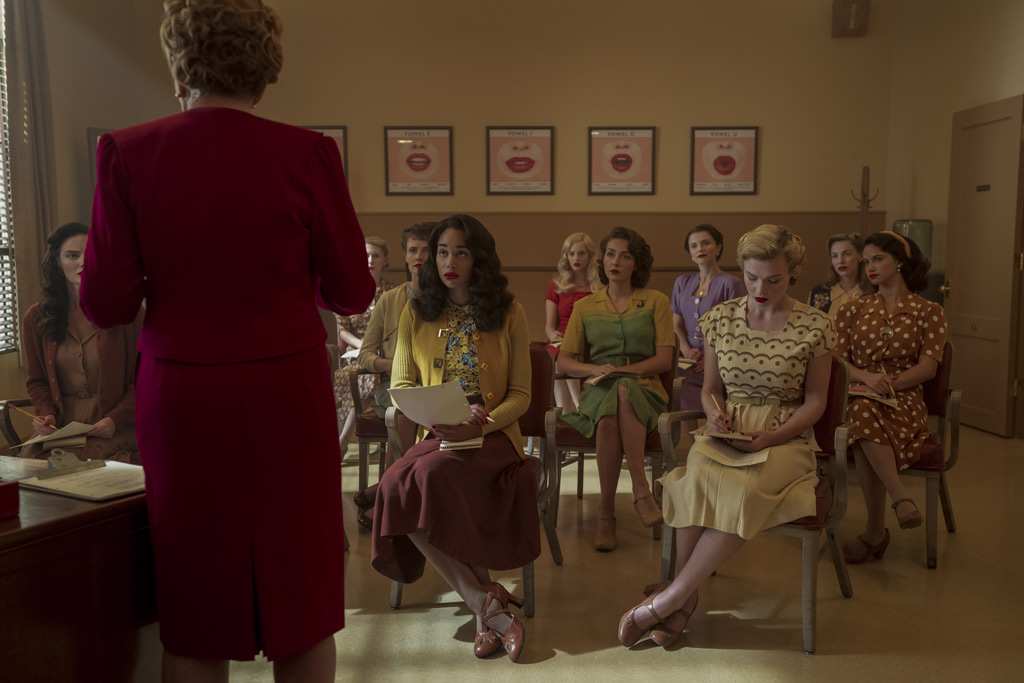
An operation of semantic manipulation, Hollywood is the grand counter-history that you imagine that fragment of time to be. While consciously suspending a fair level of disbelief from the pilot episode, the retelling takes big swings, effectively and enticingly eviscerating anything the system of patriarchy has had a firm grip on. For starters, the presumed protagonist whose head is perpetually in the clouds is revealed to be completely at the guilt-laced mercy of societal and marital expectations, the grumbling underbelly of seedy, under-the-table prostitution operates with a thin veil of discretion in broad daylight, stereotyped race and hushed homosexuality is addressed in brave realization, and women are not only taking the wheel, but consequently ramming the pedal to the metal in resolve. Sure, it is not always the straightest path these real and reel figures navigate, and that the means do not necessarily follow the compass of moral north, but at least most, if not all of them had a clear end goal—and that they were hell bent on reaching it, at whatever cost.
“We tried to shine light on the deep tragedies that did happen, but ultimately we wanted to tell a story of triumph,” elucidates Janet Mock, producer and writer for the series alongside Ryan Murphy and Ian Brennan. “It was important to us that tell an aspirational story, and that we show a different kind of portrait of what the winners and dreamers look like. Because today, we’re still grappling with an industry were there are far too few people of color on screen, far too few LGBTQ people and women in power.”
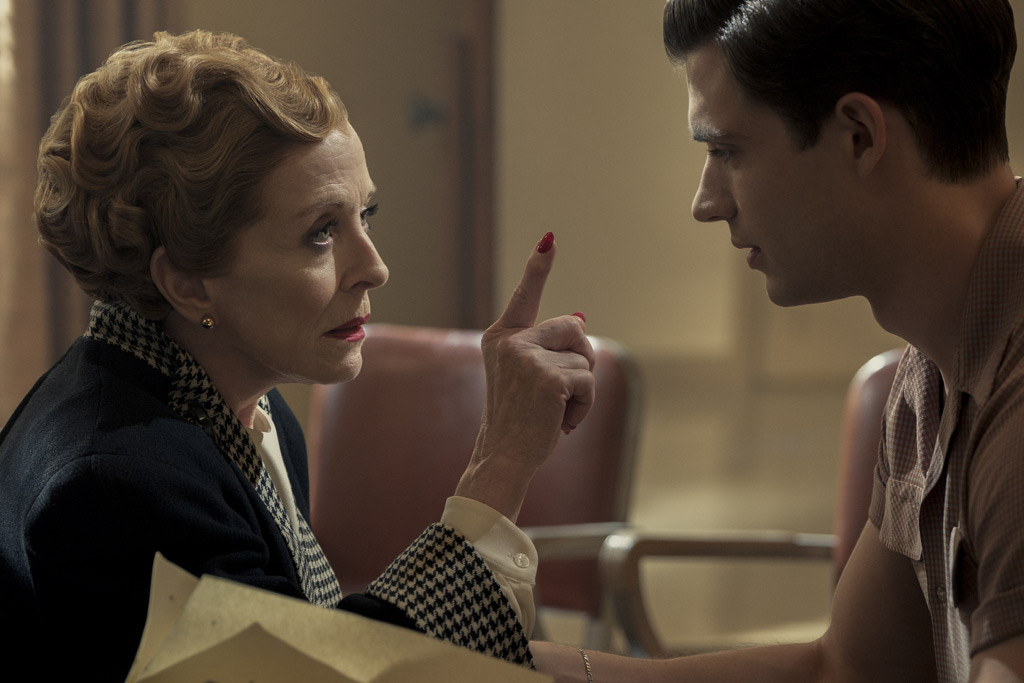
And this was what Hollywood intended to dissect and address. By breaking down the pestilent pillars of prejudice, coercion, and corruption that held up the landscape of film, this deep dive and distortion of what actually took place inadvertently unravels and informs the very same space it moves around in present time. “I was very interested in Anna May Wong, and Hattie McDaniel and Rock Hudson because they were all people who should have been able to be themselves and be celebrated, but they were not. They were victims of the Hollywood system and they were under-appreciated. All three of those had tragic endings. I was interested in this idea of giving them happy endings. What would that look like? How would you do it?” says Ryan Murphy, obviously challenging the realities of these forgotten souls. “Everything that we wrote felt like it could happen today, so it did not feel like we were writing a period piece. But it did feel like we were righting several wrongs, and that was very moving to do.”
“In every show he’s ever done, Ryan has always looked out for the underdog, whether it’s done in a playful or scary and harsh way. He’s always been an advocate personally, and in his narratives in film and TV, an advocate for people who have been historically marginalized,” explains Darren Criss, who not only plays Raymond Ainsley, the half-Filipino up-and-coming director who is actively seeking to break down barriers through his privilege of passing as white with decisive passion, but also stands as an executive producer for the series. “It’s not that the talent isn’t there, that the craft isn’t there. People of color weren’t given the opportunity to show what they can do. Even when they do have that opportunity, the door is still shut. They are invited into the room to watch, and someone else is rewarded,” furthers Janet Mock, particularly alluding to the narrative of Anna May Wong, but also reaching to the overarching trajectories of Avis Amberg, a once-upon-a-time silent movie star turned dissatisfied wife (whose grit and grace is brought to life by the incandescent Patti Lupone) and Archie Coleman (played by an intelligently instinctive Jeremy Pope), the budding screenwriter who walks the tightrope of idealism and pragmatism. “It’s so much more than the glamour of making movies. It’s about the people who have not been invited in, who haven’t had a seat at the table.”
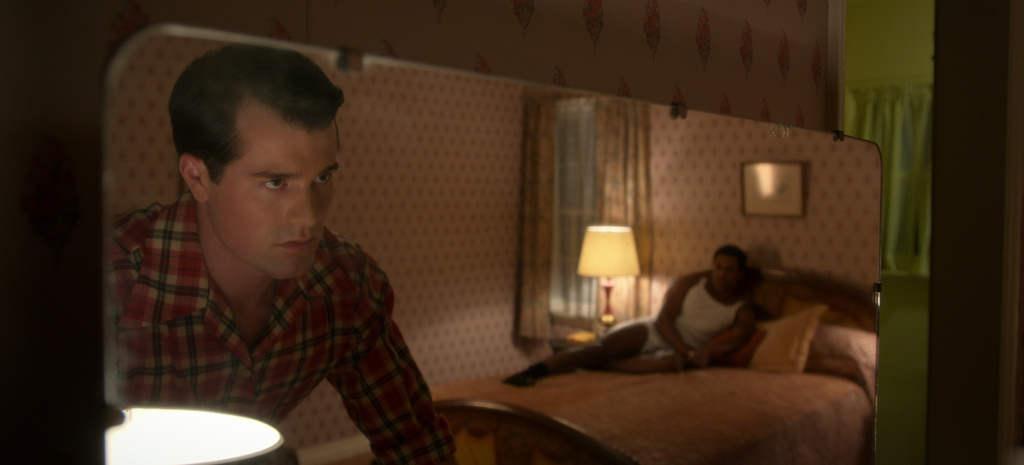

Even in its utopic paradigm, where the issues of race, gender, and sexuality are crammed into every corner and crevice to be confronted and not just glossed over in trite tokenism, Hollywood understands that it is still a persisting problem that dictates the way the industry still operates on, which is why it employs a fairytale-like approach to the many potential landmines that can set the entire undertaking off. This is where it falters, as its polish and perfection can undermine the psychology of individual journeys and general narrative, as it is typical when dealing with the blinding veneer of filmmaking magic. On the contrary, it’s not that the many Cinderella-stories are unwarranted, especially since most are neatly resolved and festooned with a perfectly tied bow, or in this case, glimmering golden statuettes in the completely redrawn 1948 Academy Awards, but it’s just that there exists a nagging unsettlement that the comeuppance seemed hurried that the underdog paradox that was launched to great heights fell to a thud. Save for the powerful and rightfully deserved victory of Anna May Wong (Michelle Krusiec) and the boiling exchange of betrayal and threat between Rock Hudson (a nuance of self-effacing modesty and devastating sensitivity by Jake Picking) and Henry Wilson (essayed with deliciously malevolent brilliance by Jim Parsons) that completely pierces to the trenches of the soul, thereby overturning the tragic end of the historical Hollywood leading man, everything else feels like a well-placed, but arbitrary triumph.
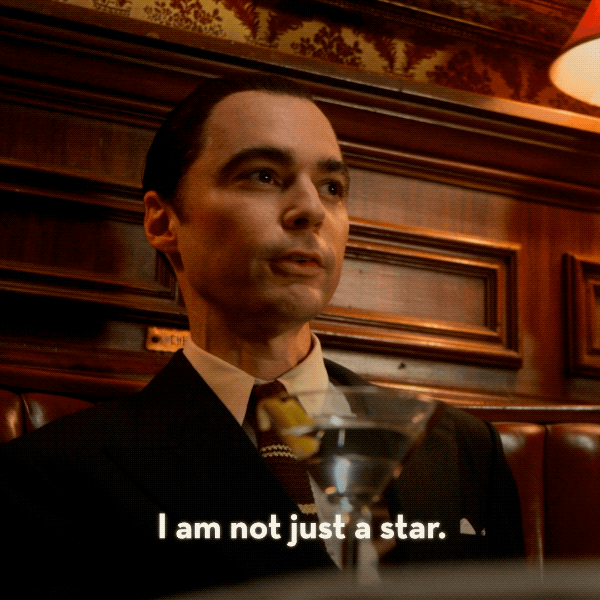
Acutely aware of the lofty ideals that its hypothetical parallel of cinematic history however, Hollywood makes good on its promise, which is encapsulated by Raymond Ainsley in an earlier exchange. “Movies don’t just show us the way the world is, they show us how the world could be,” he says, unaware of the implications of this prophetic declaration. Coming full circle, the case of permissible historical revisionism gives a sort of retroactive justice to the befallen greats, but it also critiques the very system it subsists on. More than just romancing the past in a wonderful world it would have been, Hollywood creates a dialogue that cuts through time, revealing more than just a razzle-dazzle of entertainment. “We learn life lessons from what we see on the screen. We learn how to act, how to fall in love, how to forge friendships, make enemies. It gets into our permeable membranes. Hollywood has always been a great teacher for me, and I think this show offers world we need to be reminded of—a place where the good guys win and a new day is dawning. At its core, that’s what this show is about: happy endings.”
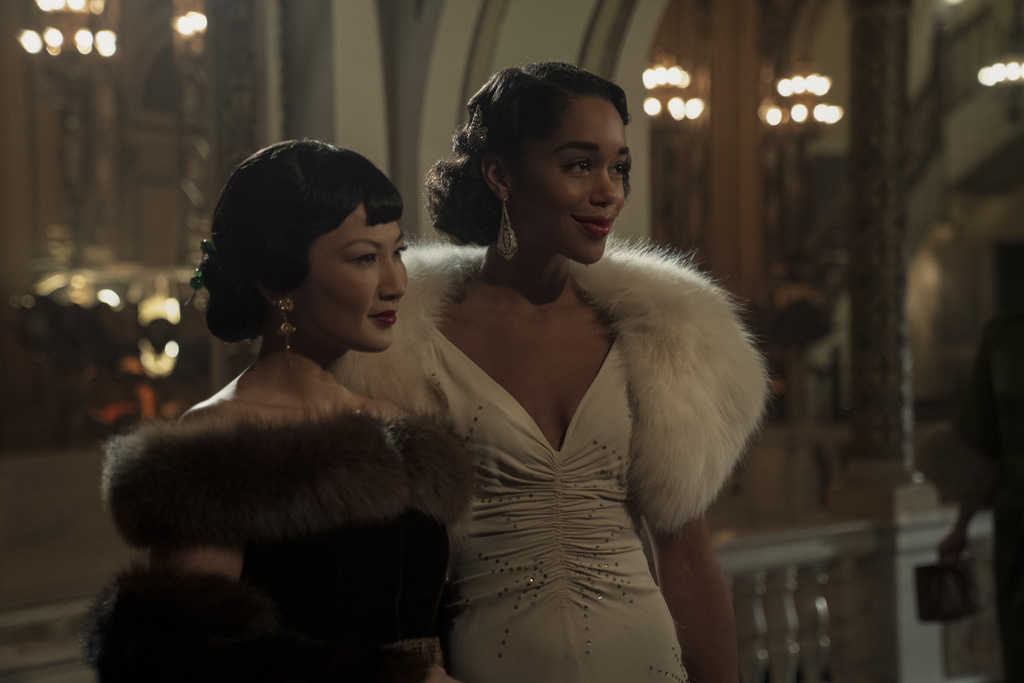
As this is still primarily a work of fiction, it goes without saying that it shouldn’t be taken with a grain of salt. Unfortunately, progress breathes the same air as regression, so it is a constant dance of one step forward, two steps back. However, it is a success of storytelling that carves out a possibility from the familiar, rather than enacting a cinematic revolution, which in itself decided in its intent and purpose. In this rooted premise, we are reminded of our inherent power to imagine, which in turn educates the way we view things. You know what they say, all great things spring from a compelling story—and this commitment to the medium and message will see no end, guaranteed.
“To everybody listening, your story is important. Don’t go thinking otherwise; don’t let your story go untold. You are important. Your life has value,” says Archie Coleman as he received his Academy Award for Achievement in Screenwriting at the fictional Oscars, his words reaching far and wide to those that needed to hear it. “You go out and you live your life with your head held high and you tell your story, because I’m proof that there are folks out there that want to hear it.”
Unlike the black and white motion pictures that ended with a decided “The end” of its era, the series makes one final liberty and signs it off with the curious “The beginning,” alluding to a hopeful continuation beyond the limits of the turbulent past of the silver screen’s glory days.
Now this is the true Hollywood story.
Hollywood is streaming on Netflix now.
